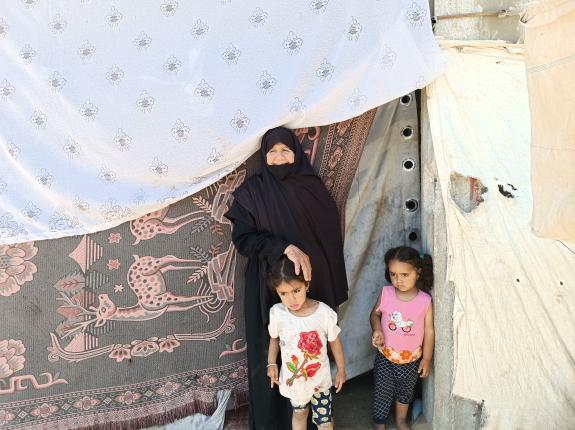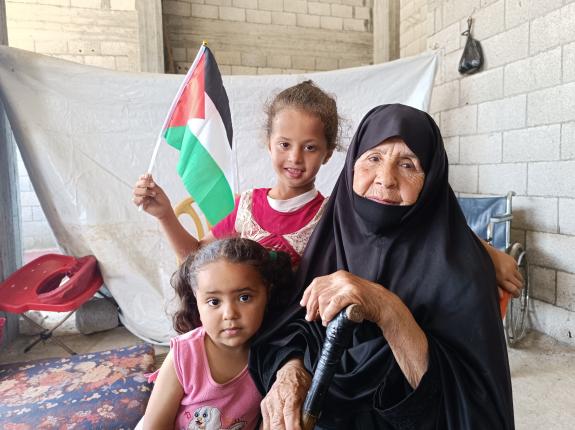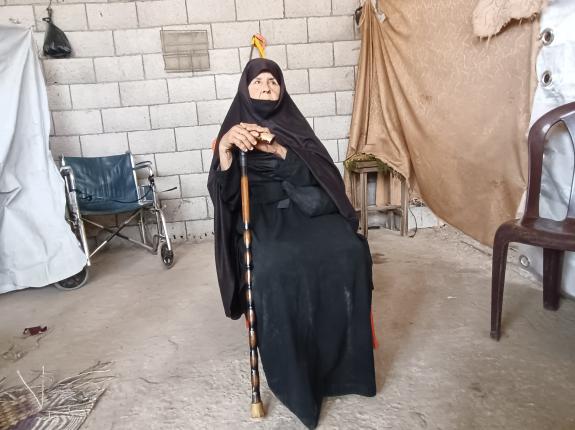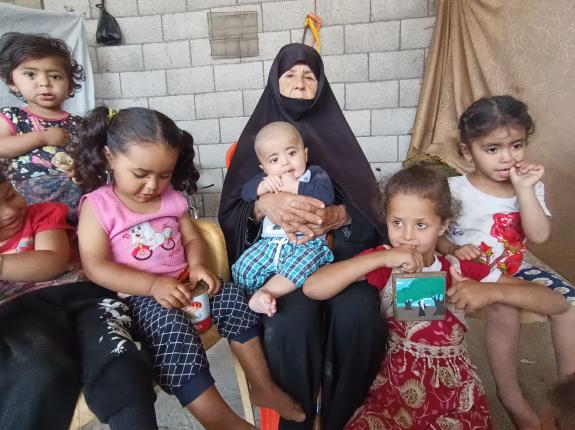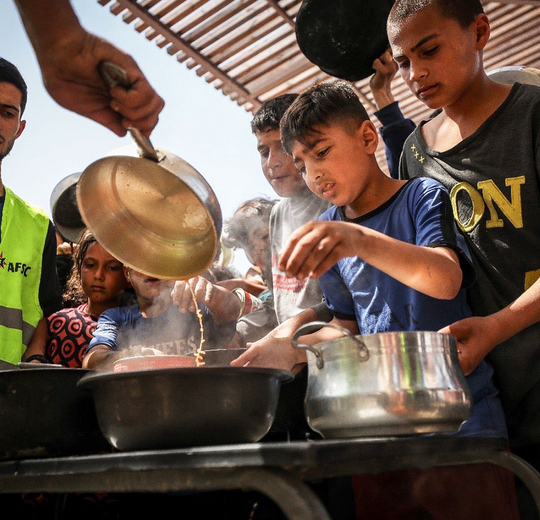I am a Palestinian woman, 80 years old, born before the Nakba in 1948. I was 4 years old when Palestine was occupied. I live with my deaf children and 27 grandchildren in my house on the eastern border separating us from our occupied lands. My family has been in danger all our lives because of our proximity to the border, but I consider this place my life and I feel a strong connection to it. Our demand is the liberation of our homeland and our return to our homes destroyed by the occupation during this oppressive war.
I live with my deaf children in the eastern part of Bureij refugee camp, in the Gaza Strip. We left our house under heavy shelling in mid-October 2023, on the third day of the Israeli war. We fled to the UNRWA schools in Bureij camp, then we moved to Khan Younis city, and finally returned to a tent at the entrance of Bureij. We lived there for three days without food or water. These were the toughest days I have experienced in my 80 years of life. My name is Fatima Ahmed Abu Bakra.
I am a Palestinian woman, 80 years old, born before the Nakba in 1948. I was four years old when Palestine was occupied. I experienced the suffering of displacement after the Nakba, and now I am enduring the unprecedented and ferocious war on the Gaza Strip, ongoing for more than seven months. I witnessed the occupation of Palestine, and today I witness hundreds of massacres committed by the occupation against more than 2.3 million Palestinians living in the Gaza Strip.
I got married when I was 16 years old and gave birth to five sons: Ayman, Salmaan, Mohammed, Radwan, and Ahmed, and five daughters: Iman, Hanan, Safaa, Hanaa, and Wafa. Four of my sons are deaf and mute. I separated from my husband 40 years ago.
I live with my deaf children and 27 grandchildren in my house in the eastern part of Bureij camp, on the eastern border separating us from our occupied lands. I built a modest house and have been living in it for 40 years. My family has been in danger all our lives because of our proximity to the border, but I consider this place my life and I feel a strong connection to it.
In 2006, the occupation forces waged a war for several days after Palestinian fighters captured the Israeli soldier Gilad Shalit. During this conflict, my deaf son Ahmed was wandering behind our house. He left without hearing the sound of gunfire, heading to Maghazi camp. The occupation forces shot him three times in the chest, and he was martyred instantly. Also, my sons’ half-brother from their father, named Fadi, was martyred, and the occupation arrested their half-brother from their father, named Muntasir.
I’ve struggled a lot in my life, and I managed to get my son Mohammed, the only one of my sons who is not deaf, into university. He obtained a bachelor’s degree in Arabic language, but could not find a job in the Gaza Strip due to the continued Israeli siege in place since 2006. He used to work as a taxi driver, but during the war he lost his job, and then there was no one to provide for us.
After working hard, I managed to marry off all of my sons and now have grandchildren. My son Mohammed has eight children: Maaz, 13 years old; Ahmed, 12 years old; Muawiyah, seven years old; Mohammed, four months old (born during the war); Amira, 15 years old; Fatima, 13 years old; Khadijah, five years old; and Sara, four years old. My son Ayman has four children: Adnan, seven years old; Halima, four years old; Amina, three years old; and Ghalia, two years old. My son Salmaan had two daughters. My daughter Hanan had four sons and two daughters. My daughter Iman had three sons and one daughter. My daughter Hanaa had a son and two daughters. My son Ahmed was martyred before getting married. I have my daughter Safaa, 40 years old, who lives with me and never married.
On the third day of the Israeli occupation’s war on the Gaza Strip, after intense Israeli shelling of the eastern areas of Bureij camp, my children, grandchildren, and I, numbering over 20, fled. We only managed to save our lives; we couldn’t take anything from the house, just the clothes on our backs. The shelling was severe, and I hugged my children and grandchildren. We ran under the bombardment together. I was hit by shrapnel in my head and foot, and I still suffer from my injuries to this day. We reached Abu Halou’s schools in Bureij camp, running more than two kilometres [1.2 miles] under the shelling, thinking we had reached a safe place in the UNRWA school.
We stayed in the schools set up as shelters in Bureij camp for two months. After the occupation forces raided the camps of the central governorate of the Gaza Strip, we fled to Khan Younis city. We lived there for two weeks in the open, unable to find a tent to live in. We endured the heavy rain and cold without shelter.
My son Mohammed’s wife gave birth to her son Mohammed while we were living in the displacement tents in Rafah city. Those were very difficult days. The newborn lived with us in the open. We stayed in Khan Younis for about three weeks, and after the occupation withdrew from the camps of Bureij, Maghazi, and Nuseirat, we returned to Bureij camp. We couldn’t return to our home in the eastern part of Bureij camp because the occupation vehicles were close to our house. We learned from our neighbours that the occupation had completely destroyed our house. I was forced to live with my children in a small shack without a door, in a house under construction at the western entrance of Bureij camp.
We were among the first displaced people to return to Bureij camp. We found only a few residents. The shelling was intense everywhere. We spent three days without food or water. We had no money, and there were no markets, no sellers, and no institutions in Bureij camp from which to get food. We found nothing to eat.
The children cried a lot. We lived in this cramped place, unsuitable for living, with more than 20 other displaced people, mostly children and women. I used to go out with my children searching for food and water, but we couldn’t find any. Fear filled all our hearts, but we managed to stay alive. Everyone survived by drinking a little water. We got a little food on the fourth day after our return from Khan Younis.
Since the early days of the war on Gaza, I have known nothing about my deaf son Salmaan, who lives in Rafah city near his wife’s family home. I tried to reach him, to contact him, and to check on him and his children, but I couldn’t. I searched a lot for him, but I didn’t hear any news about him.
I suffer from chronic hypertension and severe pain in my foot. I’ve been suffering from my head and foot injuries since the early days of the war. I have become forgetful due to the injury, but my heart is attached to my sons and my house in the eastern part of Bureij camp. I have lived in this house for over 40 years. I’ve lived my youth and old age in it. I bid farewell to my son as a martyr there and watched my grandchildren play in it. My house means everything to us.
My dream is to see my son Salmaan again, to be able to meet him again. I hope he is safe and has not been hit by the occupation’s rockets and shells. I wish to see him, to embrace him and my grandchildren soon. I dream of being able to rebuild my house anew, to keep my children around me until the last day of my life.
I lost my son Ahmed as a martyr in 2006. In this newest war, I was injured in my head and foot. The occupation destroyed my house, and it separated me from my son Salmaan. We’ve lived more than seven months in extremely difficult conditions. We are still homeless, but we love this land, and we are ready to live in a tent on top of our destroyed houses. We will never leave Gaza. This is our land, and the occupation must leave. The occupation must be tried for all its crimes against us, and for all the suffering we have endured since the first day of the war. We are currently living as displaced people on the little aid we receive from relief organizations. Our demand is not just food and water – our demand is the liberation of our homeland and our return to our homes destroyed by the occupation during this oppressive war.
Take action now
Tell Congress to demand lifesaving aid for Gaza
The humanitarian crisis in Gaza has reached catastrophic levels. Since March 2, 2025, Israel—with full support from the U.S.—has severely restricted food, water, medicine, and humanitarian aid from entering Gaza.
Contact
If you have questions or concerns, please contact us at gazaunlocked@afsc.org.


